
KOREAN JOURNAL OF PLANT TAXONOMY
Scope & Guideline
Cultivating collaboration in plant taxonomy research.
Introduction
Aims and Scopes
- Plant Taxonomy and Systematics:
The journal extensively covers the classification, identification, and nomenclature of plant species, providing insights into their taxonomic relationships. - Phylogenetic Studies:
Research involving phylogenetic analyses using molecular data, particularly chloroplast genomes, to elucidate evolutionary relationships among plant taxa. - Biodiversity and Conservation:
Focus on documenting plant biodiversity, including new species records and conservation statuses, particularly in the context of the Korean Peninsula and neighboring regions. - Morphological and Palynological Studies:
Studies that involve morphological traits and palynology to understand plant diversity and adaptations in various ecosystems. - Genomic and Genetic Research:
Incorporation of genomic data, including complete chloroplast genome sequences, to investigate genetic diversity and evolutionary processes.
Trending and Emerging
- Chloroplast Genome Sequencing:
There is a growing trend in utilizing complete chloroplast genome sequencing to explore phylogenetic relationships and genetic diversity among plant species. - Conservation Genetics:
An increasing emphasis on conservation genetics is evident, with studies focused on the genetic diversity of endangered species and the effectiveness of conservation strategies. - Molecular Systematics:
Molecular systematics is gaining traction, with more studies employing molecular markers to resolve taxonomic ambiguities and clarify evolutionary relationships. - Alien Invasive Species Research:
Research on the impacts and management of alien invasive species is on the rise, reflecting a growing concern for biodiversity conservation in the face of globalization. - Ecological and Environmental Impact Studies:
Emerging themes include studies that assess the ecological impacts of specific plant species and their roles in ecosystems, emphasizing the interplay between taxonomy and ecology.
Declining or Waning
- Traditional Morphological Studies:
Although morphological studies remain important, there has been a noticeable decrease in papers solely focused on traditional morphological identification, possibly due to the rise of molecular techniques. - General Flora Surveys:
Broad surveys of flora without specific taxonomic or ecological focus have become less prevalent, as more targeted studies are being favored. - Invasive Species Reports:
Reports on invasive species are becoming less frequent, possibly as researchers shift towards more detailed ecological impacts and management strategies. - Local Flora Documentation:
While still relevant, the frequency of documentation of local flora in specific regions has decreased, reflecting a broader trend towards global biodiversity assessments. - Historical Taxonomic Reviews:
Papers focusing on historical reviews of plant taxonomy are less common, as the field moves towards more dynamic and contemporary studies.
Similar Journals

Bangladesh Journal of Plant Taxonomy
Fostering knowledge, preserving biodiversity.Welcome to the Bangladesh Journal of Plant Taxonomy, a leading open-access publication dedicated to advancing the understanding of plant taxonomy in the context of Bangladesh's rich biodiversity. Published by the Bangladesh Association of Plant Taxonomists, this journal plays a crucial role in fostering academic discourse and dissemination of research findings since its establishment. With its ISSN 1028-2092 and E-ISSN 2224-7297, the journal provides a platform for researchers, professionals, and students to share their contributions to plant science. Although it has discontinued its coverage in Scopus from 2018, it remains a valuable resource, evidenced by its rankings in the agricultural and biological sciences categories, including a placement of #330/403 in Plant Science and #515/588 in Ecology, Evolution, Behavior, and Systematics. Open access since 2005, the journal ensures that critical research is freely available to all, supporting the global community in the study and preservation of plant biodiversity.
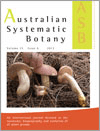
AUSTRALIAN SYSTEMATIC BOTANY
Cultivating Knowledge in Systematic BotanyAustralian Systematic Botany is a prestigious academic journal dedicated to the field of plant science, published by CSIRO PUBLISHING. Established in 1988, this journal has become a vital resource for researchers, professionals, and students focusing on the systematic study of Australian flora. With an impressive track record and convergence extending to 2024, it operates in the Q3 category for Ecology, Evolution, Behavior and Systematics and Q2 for Plant Science as of 2023. The journal holds significant value in the academic community, given its Scopus ranking, which places it in the 61st and 59th percentiles within its respective categories. Although it follows a subscription-based model, the journal remains committed to advancing knowledge in systematic botany, offering critical insights that shape the future of ecological and biological research both in Australia and globally.

TAXON
Championing high-impact research in ecology and evolution.TAXON is a premier international journal published by Wiley, dedicated to the fields of ecology, evolution, behavior, systematics, and plant science. With a distinguished history since 1970 and a commitment to advancing knowledge in the biological sciences, TAXON has been recognized in the Q1 category for both its ecological and plant science contributions as of 2023. The journal boasts an impressive Scopus ranking, placing it in the 76th percentile for Ecology, Evolution, Behavior and Systematics and the 74th percentile for Plant Science, highlighting its significance and impact within these domains. While not an open-access publication, TAXON offers a wealth of high-quality research articles, reviews, and discussions, making it an indispensable resource for researchers, professionals, and students alike seeking to deepen their understanding of biodiversity and systematics. For access to its cutting-edge research, readers can follow the journal's updates and contributions online.
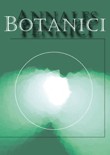
ANNALES BOTANICI FENNICI
Championing High-Quality Research for a Greener FutureANNALES BOTANICI FENNICI, published by the Finnish Zoological Botanical Publishing Board, is a distinguished journal that has served as a vital platform for advancing research in the fields of Ecology and Plant Science since its inception. With an ISSN of 0003-3847 and an E-ISSN of 1797-2442, this journal has established a reputation as a Q3 category publication in both Ecology, Evolution, Behavior and Systematics, and Plant Science as of 2023. Although it presently does not offer open access options, the journal remains a cornerstone in the dissemination of important research findings and methodologies pertinent to these scientific domains. By promoting high-quality research, ANNALES BOTANICI FENNICI not only contributes to scholarly discourse but also enriches the academic community in Finland and beyond. Researchers, professionals, and students are encouraged to explore its archives, engaging with a wealth of knowledge that spans over four decades, from 1973 to 2023, thereby enhancing their understanding and furthering their studies in botany and ecology.
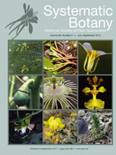
SYSTEMATIC BOTANY
Connecting Taxonomy with Evolutionary InsightsSystematic Botany, published by the American Society of Plant Taxonomists, is an esteemed journal focusing on the diverse fields of plant taxonomy, systematics, and evolution. With an ISSN of 0363-6445 and an E-ISSN of 1548-2324, this journal serves as a critical platform for researchers aiming to advance our understanding of plant biodiversity and evolutionary relationships. Operating since 1994, Systematic Botany has garnered significant recognition, achieving a Q2 ranking in Ecology, Evolution, Behavior and Systematics, and Plant Science categories, and ranking within the top half of Scopus for Genetics. The journal prioritizes publishing high-quality, peer-reviewed research, making it an essential resource for academics, practitioners, and students alike. Although it does not provide open access options, the journal's robust reputation in both American and international botanical research speaks to its pivotal role in disseminating vital scientific knowledge in the field. For those interested in the latest advancements in plant science, Systematic Botany is indispensable.
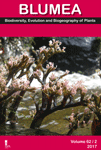
BLUMEA
Connecting academia with sustainable practices.BLUMEA is a distinguished peer-reviewed journal published by RIJKSHERBARIUM in the Netherlands, specializing in Ecology, Evolution, Behavior and Systematics as well as Plant Science. With an ISSN of 0006-5196 and an E-ISSN of 0373-4293, this journal has established itself as a vital resource for academics and practitioners alike since its inception in 1993, with plans to continue through 2024. Currently holding a Q2 quartile ranking in both relevant categories, BLUMEA is positioned as a significant contributor to the advancement of knowledge in its fields, generating innovative research that informs sustainable practices and biodiversity conservation. Although it currently does not offer Open Access options, its insights are critical for those involved in plant sciences and ecological research. Positioned within the Scopus database, the journal ranks at the 41st percentile in Plant Science and the 39th percentile in Ecology, reflecting its substantial impact within the academic community. Researchers, students, and professionals who engage with BLUMEA will find it to be an indispensable source for high-quality research and valuable discussions aimed at shaping the future of ecological studies and botanical science.
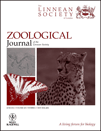
ZOOLOGICAL JOURNAL OF THE LINNEAN SOCIETY
Illuminating the wonders of zoology since 1866.Zoological Journal of the Linnean Society, published by Oxford University Press, stands as a prestigious vessel for scholarly discourse in the fields of Animal Science and Ecology. With an ISSN of 0024-4082 and E-ISSN 1096-3642, this journal has an illustrious history dating back to its inception in 1866, and has consistently contributed groundbreaking research that shapes our understanding of zoology and evolutionary biology. Operating out of the United Kingdom, the journal boasts an impressive Q1 ranking in both Animal Science and Zoology and Ecology, Evolution, Behavior and Systematics, positioning it among the top tier of its category. With a significant presence in the academic landscape, the journal ranks 24th among 490 in Animal Science and 97th among 721 in Ecology, reflecting its impact and relevance in the field. Although it is not an open access journal, the wealth of knowledge it offers is invaluable for researchers, professionals, and students alike, aiding in the advancement of zoological sciences.
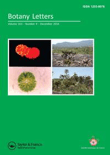
Botany Letters
Unlocking the Secrets of Plant Biodiversity and SustainabilityBotany Letters, published by Taylor & Francis Ltd, is a prominent journal in the field of Plant Science based in the United Kingdom. With its ISSN 2381-8107 and E-ISSN 2381-8115, the journal has established itself as an essential resource for researchers, professionals, and students alike, focusing on innovative studies and findings in botany. As a Q2 ranked journal in its category (2023) and holding a respectable Scopus rank of #200 out of 516 in Agricultural and Biological Sciences, it reflects a robust commitment to quality and relevance in the field. The journal's open access model ensures that groundbreaking research is readily accessible, fostering collaboration and knowledge sharing among the global scientific community. Covering a broad spectrum of topics within plant science from 2016, Botany Letters aims to catalyze advancements in the understanding and management of plant biodiversity and sustainability, ultimately contributing to conservation efforts and agricultural innovation.

KEW BULLETIN
Illuminating the Path of Ecological and Botanical DiscoveriesKEW BULLETIN is an esteemed academic journal dedicated to the fields of plant science and ecology, published by SPRINGER LONDON LTD. With an ISSN of 0075-5974 and E-ISSN 1874-933X, it has been a significant resource for researchers and scholars since its inception in 1993, currently covering converged years up to 2024. The journal holds a notable position with a 2023 category quartile ranking of Q3 in Ecology, Evolution, Behavior and Systematics and Q2 in Plant Science, highlighting its contributions to advancing knowledge in these critical areas. Its Scopus ranks—#333 in Plant Science and #475 in Ecology, showcasing a percentile rank of 35th and 34th respectively—further authenticate its standing among peers. While KEW BULLETIN is not an open-access publication, it offers valuable research findings, insightful reviews, and fosters academic discourse, making it an essential platform for professionals, students, and researchers passionate about understanding the intricacies of plant life and ecological systems. Located at 236 Grays Inn Rd, 6th Floor, London WC1X 8HL, England, the journal remains committed to disseminating high-quality research and supporting the scientific community.
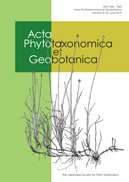
Acta Phytotaxonomica et Geobotanica
Advancing Plant Science and EcologyActa Phytotaxonomica et Geobotanica, published by the Japanese Society for Plant Systematics at the University of Tokyo, serves as a vital platform for advancing research in the fields of ecology, plant science, and biodiversity. With an ISSN of 1346-7565 and an E-ISSN of 2189-7042, this journal not only provides a comprehensive evaluation of current topics within these categories but also addresses the intricate connections between plant systems and their ecological environments. Although currently not open access, the journal is essential for researchers aiming to publish cutting-edge findings, contributing significantly to its classification within the Q3 quartile across multiple disciplines, including Ecology and Plant Science. With an ambitious focus on enhancing the understanding of plant taxonomy and geography through a convergence of research periods from 2014 to 2024, Acta Phytotaxonomica et Geobotanica plays a pivotal role in fostering academic discourse and innovation in plant systematics. Its geographical foundation in Japan enriches the journal's unique perspective on regional flora, making it an indispensable resource for students, researchers, and professionals in the field.